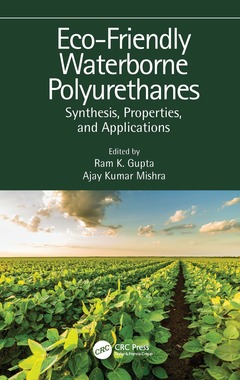Eco-Friendly Waterborne Polyurethanes Synthesis, Properties, and Applications
Coordonnateurs : Gupta Ram K., Mishra Ajay Kumar

The polyurethane industry is among the fastest growing, with polyurethanes used in consumer as well as industrial sectors. Waterborne polyurethanes (WPUs) exhibit many advantages over conventional volatile organic compounds (VOCs) based polyurethanes and have emerged as an environmentally friendly alternative. WPUs offer an opportunity to use sustainable raw materials to produce environmentally sustainable polymers, particularly, polyols derived from vegetable oils. Eco-Friendly Waterborne Polyurethanes: Synthesis, Properties, and Applications provides state-of-the-art knowledge of the synthesis, application, and property enhancement of WPUs.
- Covers various types of eco-friendly materials and technologies used to synthesize WPUs
- Presents an overview and applications of WPUs in several advanced research areas
- Provides fundamentals of synthetic processes and their chemistries for specific applications
- Elaborates on advanced approaches used to convert renewable resources into polymers
- Offers new direction to scientists, researchers, and students to better understand the chemistry, technologies, and applications
Written for polymer chemists, materials scientists, and other researchers and industry, this book serves as a comprehensive reference for readers interested in the development and application of sustainable polymers.
Chapter 1 Introduction to Waterborne Polyurethanes
Chapter 2 Chemistry and Technology of Waterborne Polyurethanes
Chapter 3 Green Materials for Waterborne Polyurethanes
Chapter 4 Eco-Friendly Synthesis for Waterborne Polyurethanes
Chapter 5 Synthesis, Properties, and Applications of Waterborne Polyurethanes
Chapter 6 Nanocomposites of Waterborne Polyurethanes
Chapter 7 Waterborne Polyurethanes for Flexible and Rigid Foams
Chapter 8 Flame-Retardant Waterborne Polyurethanes
Chapter 9 Synthesis, Characterization, and Applications of Smart Waterborne Polyurethanes
Chapter 10 Shape Memory Waterborne Polyurethanes
Chapter 11 Waterborne Polyurethanes for Self-Healing Applications
Chapter 12 Waterborne Polyurethanes for Biomedical Applications
Chapter 13 Waterborne Polyurethanes for Tissue Engineering
Chapter 14 Waterborne Polyurethanes for Biodegradable Coatings
Chapter 15 Recent Developments in Waterborne Polyurethanes for Coating Applications
Chapter 16 Waterborne Polyurethanes for Weather Protective Coatings
Chapter 17 Recent Developments in Waterborne Polyurethanes for Corrosion Protection
Chapter 18 Waterborne Polyurethane for Electrically Conductive Coating
Chapter 19 Waterborne Polyurethanes for Electrical Applications
Chapter 20 Waterborne Polyurethanes for Sensors
Chapter 21 Waterborne Polyurethanes for Sealants
Chapter 22 Waterborne Polyurethanes for Packing Industries
Chapter 23 Waterborne Polyurethanes for Automobile Industries
Chapter 24 Non-Isocyanate-Based Waterborne Polyurethanes
Chapter 25 Waterborne Polyurethanes: Challenges and Future Outlook
Ram K. Gupta is Associate Professor of Chemistry at Pittsburg State University. Dr. Gupta’s research focuses on green energy production and storage using conducting polymers and composites, electrocatalysts for fuel cells, nanomaterials, optoelectronics and photovoltaics devices, organic-inorganic hetero-junctions for sensors, nanomagnetism, bio-based polymers, bio-compatible nanofibers for tissue regeneration, scaffold and antibacterial applications, and bio-degradable metallic implants. Dr. Gupta has published over 200 peer-reviewed articles, given over 275 national/international/ regional presentations, chaired many sessions at national/international meetings, wrote several book chapters, and received over two million dollars for research and educational activities from external agencies. He serves as Associate Editor, Guest Editor, and editorial board member for various journals.
Ajay Kumar Mishra (MSc, MPhil, Ph.D., FRSC) is Professor of Chemistry at the Nanotechnology and Water Sustainability Research Unit at the College of Science, Engineering & Technology at the University of South Africa. He also holds an adjunct professorship at Jiangsu University, China. His research interests include the synthesis of multifunctional nanomaterials, including polymers, carbon nanomaterials, composite materials, and wastewater research. Prof. Mishra has authored and edited numerous peer-reviewed scientific international journal articles and books in this subject area.
Date de parution : 01-2022
15.6x23.4 cm
Thèmes d’Eco-Friendly Waterborne Polyurethanes :
Mots-clés :
green polymers; Waterborne; Polyurethane; Dispersions; polymer chemistry; polymer synthesis; flame retardant; Waterborne PUs; polyurethanes adhesives; WPU Film; Waterborne Pu Coating; WPU Dispersion; Soft Segments; Hard Segments; DMPA; Di-methylol Propionic Acid; GO; IPDI; Internal Emulsifier; Pu Dispersion; Chain Extenders; American Chemical Society; Shape Memory; MMT; Pu Particle; Pu Pre-polymer; Shape Memory Polymers; Ionic Centers; Methylene Diphenyl Diisocyanate; MDI; Pu Coating; Coated Cotton Fabrics; Epoxidized Soybean Oil



